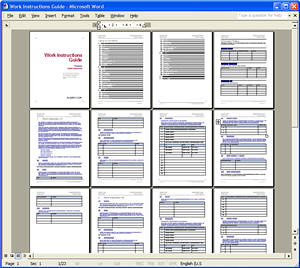I've made it clear that I'm a big fan of staying organized during the writing process. I create outlines, character sheets, the whole ball of wax. But sometimes, you need something more than the standard blank document to keep your plot organized and all your thoughts straight. I'm talking about the joy of templates.
Let's Hear it for Templates!
I've advocated using templates to keep your manuscript properly formatted; this will save you a ton of frustration and time when you convert your work into an ebook-ready format. But templates serve another important function: they can help you keep all your book notes organized.
Plots can get pretty complex, particularly if you've got a lot of characters interacting or a big event happening. I'm usually pretty straightforward when it comes to writing outlines for my stories; in the past, a blank Word document has always been good enough for me. But lately I've been working on a novel that's extremely involved. There's a special event going on over multiple weeks that involves all sorts of information and characters, and frankly it's incredibly confusing.
To keep the days of the event straight, I pulled up a calendar template that fits right onto my computer screen. It's possible to set the calendar to any year and month, so for me it worked out perfectly. I used another template to keep some very extensive notes organized and categorized (it's basically a list of objects with brief descriptions, and information about who's bringing each object -- sort of).
The point is, I'm pretty sure my book would be an utter mess without these templates. When I need to know something specific, I can just glance at a single document to find what I need. Otherwise, I'd have to crawl back through the book to find out what I want to know (and I don't need that kind of hassle).
There are dozens and dozens of templates available for a variety of word processing software. Microsoft Word, by far one of the most commonly-used processors, makes it incredibly easy to find templates. There's a built-in list of what's available, and if that isn't good enough you can always type something in the search bar to seek out the proper template online. MS Word will find the template and allow you to download it without ever leaving the program. Other word processing programs offer similar features, so you should never hesitate to look for a template if you want to get all your important notes and information well-organized.
Writers need tricks, help and props to survive, because writing is hard. Create as many documents as you like and write all the notes you need to keep your plot, characters and other pertinent information organized. The more organized you keep all your information, the less editing and re-writing you'll end up doing later.











Hmmm, very interetsing. I never really thought about templates for authors and their writing. I guess it could be quite helpfull. One thing, as a reader that I always enjoy is a map. Especially when i'm reading Fantasy novels a map is kind of crucial for me. Do you know if there's any programs out there that can easily set that up? I was always wondering.
ReplyDeleteGreat question, Nic! I've touched on the subject of maps briefly in previous posts, but this is one topic I haven't dedicated an entire post to (yet!). I personally use Google Maps to help me keep locations straight, which is very good if you're writing in a real setting. Fantasy worlds are a little different, however. I'm going to do some research on this and I'll do a 101 post on it soon, maybe sometime next week.
ReplyDelete:o thanks jade! I'll look out for that :D
ReplyDeleteI just want you to know that I read your blog daily in my email and love the content! I rarely end up actually coming here to tell you, though. :)
ReplyDeleteThanks for commenting, Laura! I'm so glad you're enjoying the blog.
ReplyDelete